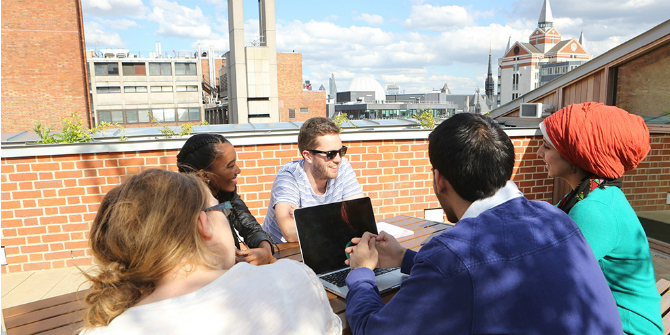There’s definitely a learning curve when starting at a new school. However, the interesting part about master’s programs is that they are often only year-long programmes. This means that the learning curve needs to be as short as possible. With this in mind, I learned a lot during my first term as a master’s student at LSE last year. These are some takeaways you should keep in mind as you start your first term.
Connect with others in your cohort
This first one may seem obvious to some, but I’m including it for reasons you might not have thought about. Getting connected to others in your cohort is a great way to socialise, make new friends, and discover people interested in the same things as you. It’s also a handy way to stay on top of things academically throughout the term. Something that I had never partaken in before attending LSE are reading and study groups. Aside from the occasional study session with a friend during undergrad, my work was primarily independent. However, due to the sheer number of readings and the format of many of the courses at LSE, I quickly realised that there were better ways to get the most out of each course. Reading or study groups allow you to break out readings and share notes. This way, each person isn’t tasked with the impossible assignment of reading 15+ academic papers each week. I’ve found that tackling our readings using this approach allows everyone to learn effectively while managing their time well, and it’s something I was sure to continue into the second term.
Reach out for help as soon as possible
Another critical takeaway has to do with asking for help. Having an undergraduate background that is different from my postgraduate subject made specific topics challenging. The last thing you’ll want to do is fall behind as a course builds upon a topic you’ve failed to master. This is where I realised the importance of asking for help – whether emailing a professor, attending office hours, or asking a friend – ensuring you understand the coursework as early as possible will set you up for success on your assessments. Speaking of assessments, reaching out for help also applies to your assessments. The assessment period at LSE differs from my past experience because most of your time spent preparing for the assessment is when the course is formally over. This often means that the office hours and help sessions throughout the term might no longer exist. With this in mind, it may be harder to get in touch with your professors about any topics or questions you have. My advice is to start preparing for your assessments as soon as possible so that you can also reach out with any concerns as early as possible. Reaching out early is critical so that it gives enough time for the professors to actually get back to you and for you to incorporate their advice into your assessment preparation. Starting early is something that I can’t stress enough.
Think carefully about your time between the two terms
My last takeaway is once again related to the assessment period. As you can see, it was a learning curve to understand how to optimally go about preparing for assessments. Assessments were doled out at the end of our course, and we had until the next term (about a month later) before the evaluation was officially due. This period also coincided with the holiday season, when people typically travel and catch up with family or friends. While all of this is incredibly important, it’s vital that you plan your time accordingly, given the assessments that also need preparation during this time. While I fit in both fun and pleasure during my break between terms, I did an even better job organising my time the following semester.





